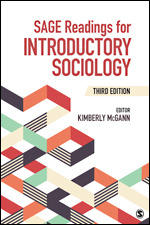SAGE Readings for Introductory Sociology
- Kimberly McGann - Nazareth College, USA
Sociology (General)
Supplements
This book provides the student with unique opportunities to unravel the concepts of sociology and to understand the meaning of sociological thinking.
One additional reading in the Third Edition (a total of 25).
New to this edition:
“Not Your Typical Student”: The Social Construction of the “First Generation” College Student, by Tina Weldhagen
W.E.B. Du Bois and Black Heterogeneity: How The Philadelphia Negro Shaped American Sociology, by Marcus Anthony Hunter
Sense & Nonsense About Surveys, by Howard Schuman
Rethinking Colorblindness: How Role Conflict Shapes Administrators' Responses to Racial Inequality at a Predominantly White University, by Cedrick Michael Simmons
Neither Clear Nor Present: The Social Construction of Safety and Danger, by Ruth Simpson
Calling the Shots: Why Parents Reject Vaccines, by Jennifer A. Reich
American Policing and the Danger Imperative, by Michael Sierra-Arevalo
Masculine Norms and Infectious Disease: The Case of COVID-19, by Tyler Ren
America for Americans: A History of Xenophobia, by Erika Lee
The Political Bind of Oil vs. Tribes, by Yvonne P. Sherwood
Identity Exploration or Labor Market Reaction: Social Class Differences in College Student Participation in Peace Corps, Teach for America, and Other Service Programs, by Alana Gillis
Strangers in Their Own Land: Anger and Mourning on the American Right, by Arlie Hochschild
Uberland: How Algorithms are Rewriting the Rules of Work, by Alex Rosenblatt
Sample Materials & Chapters
Reading 1: The Sociological Imagination
Reading 2: “Not Your Typical Student”
